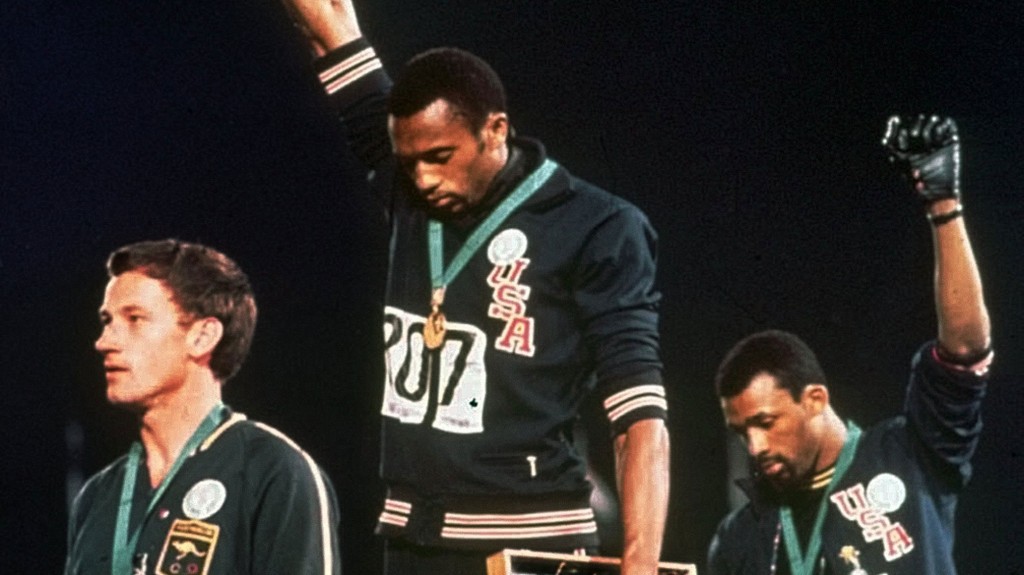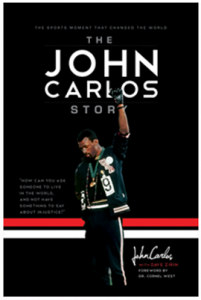This is an excerpt from the book The John Carlos Story: The Sports Moment That Changed the World. Co-author Dave Zirin appears on Moyers & Company this weekend to talk about the collision of sports and politics.

Extending gloved hands skyward in racial protest, U.S. athletes Tommie Smith, center, and John Carlos stare downward during the playing of the Star Spangled Banner after Smith received the gold and Carlos the bronze for the 200-meter run at the Summer Olympic Games in Mexico City on Oct. 16, 1968. (AP Photo/FILE)
Tommie had his gold, I had my bronze and we both had a place on that podium, just like we always wanted. Just like we saw it. We walked to the medal stand — our gloves were on, our beads were on, our shoes were off, and through the elation, the rapturous cheers from the crowd and the titanic surge of adrenaline from the race, a new feeling took over my body. I felt the focus I used to feel when I did my time in the Golden Gloves. I was thinking, “The race is over. Time for the main event. Let’s get it on!”
Tommie was in a different place. He was so jacked about setting a world record and hearing all the cheers that he broke out in this big smile and pumped both hands in the air, even though one of them had a black glove on it already! I was worried he couldn’t bring it back to the kind of serene focus we had aspired to, but then as we climbed up on the stand, my mind went far away from what Tommie was doing.
I started reflecting on my dad, the stories he told me about what he endured in the armed forces. I thought about Harlem and the way the integrated community of my youth became all black, with the money and the opportunity moving away with the white residents. I reflected on the fact that my dad told me with pain in his eyes that I wasn’t going to be able to make it to the Olympics in swimming, not because of my abilities, but because of the color of my skin. I pondered what Malcolm always said about being true to yourself even when it hurts. I thought about Dr. King’s words about why he had to go back to Memphis even though his life was in jeopardy — because he felt a calling to stand for those people who “couldn’t or wouldn’t stand for themselves.” And then finally I thought about my family, my refuge, Kim and Kimme, and I thought, “Damn. When this thing is done, it can’t be taken back.”
I know that sounds like a lot of thoughts for just a few moments standing on a podium before the start of the national anthem, but honestly this was all zigzagging through my brain like lightning bolts. It was like flashes of light dancing in my mind amidst raindrops. Before the anthem started to play, I purposefully took a moment to reflect on the artifacts we had chosen. I looked at my feet in my high socks and thought about all the black poverty I’d seen from Harlem to East Texas. I fingered my beads and thought about the pictures I’d seen of the “strange fruit” swinging from the poplar trees of the South.
When we were up there, I made the personal decision to keep my jacket open, which was a major breech of Olympic etiquette, to remember all the working-class people — black and white — in Harlem who had to struggle and work with their hands all day. I thought about the fact that I covered up the “USA” on my chest with a black T-shirt to reflect the shame I felt that my country was traveling at a snail’s pace toward something that should be obvious to all people of good will. Then the anthem started and we raised our fists into the air. If you look at the pictures, Tommie’s fist and back are so straight it looks like he was drawn up with a protractor. My arm is slightly bent. That was because I wanted to make sure in case someone rushed us, I could throw down a hammer punch to protect us. We had just received so many threats leading up to that point that I refused to be defenseless at the moment of truth.
Then, when the anthem had mercifully ended, we started walking back to the tunnel. That’s when the boos started to come in earnest. The shock was gone and it was officially getting ugly. People were throwing things at us from the stands, and I heard some people yell, “Niggers need to go back to Africa!” Someone else yelled, “I can’t believe this is how you niggers treat us after we let you run in our games.”
Then as we were walking off the field, Tommie made me very proud. As the shit and slurs were falling all around us, he looked as mad as I’ve ever seen a Southern boy look and he threw his fist up sky-high in the face of these boos. I yelled out, “Right on!” I was ready to get off that track, proud that we’d said our piece. But I had no idea the moment on the medal stand would be frozen for all time. I had no idea what we’d face. I didn’t know or appreciate at that precise moment, that the entire trajectory of our young lives had just irrevocably changed.
 |
From the book The John Carlos Story: The Sports Moment That Changed the World by John Carlos and Dave Zirin. © 2014 by John Carlos and Dave Zirin. Reprinted by arrangement with Haymarket Books. |

